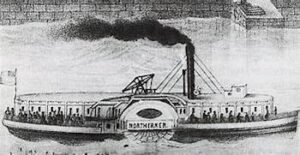
The Northerner Steamboat
*On this date in 1863, African and Native Americans intersected on the upper Mississippi River, witnessing the final chapters of American chattel slavery and "Indian removal" in Minnesota.
On May 4, the steamboat Northerner pushed up the Mississippi River from St. Louis, bound for Fort Snelling, a military outpost north of St. Paul, Minnesota. Captained by Alfred J. Woods, the steamboat encountered a large handmade raft. Aboard were seventy-six Blacks: forty men, ten women, and twenty-six children. Robert Hickman, who was from enslavement on a plantation in Boone County, Missouri, was the leader. A preacher who could read and write had seen newspaper accounts of President Abraham Lincoln's Emancipation Proclamation.
On May 5, the Northerner approached the Lowertown, St. Paul levee. As local Irish dock workers, mostly Irish, caught sight of the Blacks (commonly referred to as "contraband" by whites) on the trailing raft, they saw them as competition for jobs. As word spread, the commotion was so great that St. Paul police arrived and sided with the mob. Captain Woods ordered the boat and its raft to steam onto the fort. There, the Africans came ashore without incident and encountered hundreds of abused Native Americans huddled together, forcibly assembled near the docks.
The Dakota was part of an original group numbering more than 1,600, mostly women, children, and elders who had been held under armed guard all winter following the Dakota War of the year before in a miserable encampment in a lowland area below Fort Snelling. Minnesota government officials and military leaders were awaiting the spring thaw that would allow for their mass deportation downriver to a reservation in the Nebraska Territory. When the ice finally melted and river levels rose, hundreds died. 770 Dakota people were shipped off the day before on another steamer, the Davenport.
Having set the Hickman party ashore and unloaded the wagons and supplies for the military fort, Captain Woods ordered preparations to receive his next "cargo": 547 Dakota people, whom he was transporting for the fee of $25 per head plus 10 cents a day for sustenance. Soldiers from Fort Snelling herded the Dakota aboard the Northerner "like so many cattle," as one observer put it. As they pulled away, a local minister's wife remarked, "May God have mercy on them, for they can expect none from man."
Neither the Africans nor the Native people were aware that just five months earlier, President Lincoln was simultaneously considering two documents that would dramatically change the fates of each group: a warrant for the mass execution of thirty-eight Dakota men and the Emancipation Proclamation.